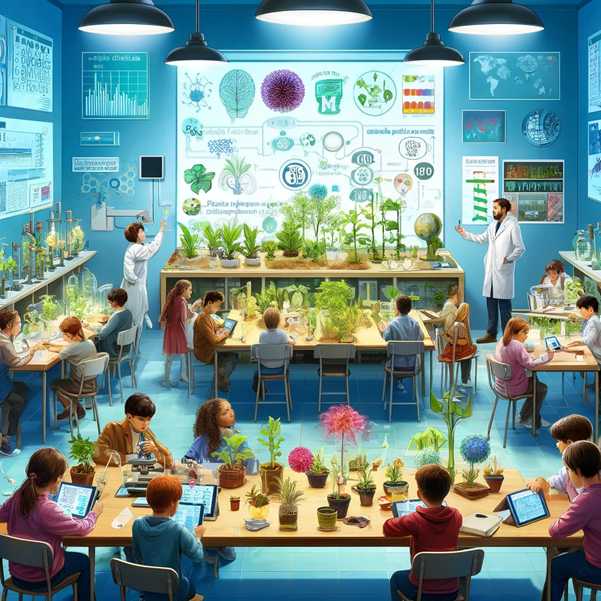Fostering Engagement: Strategies to Involve Pre-university Students in Plant Science Research
Population growth and climate change threaten food security and exacerbate agriculture’s environmental impact, necessitating a passionate, interdisciplinary community of plant science professionals to engage the public and students (Friesner et al., 2021). By involving young students in hands-on research experiences, educators can nurture critical thinking skills, scientific inquiry, and a sense of responsibility toward sustainable practices (Jordan et al., 2015). We explore effective strategies to involve pre-university students in plant science research, aiming to inspire and empower the next generation of scientists (Hubbard, 2024).
Incorporating Inquiry Learning:
Inquiry-based learning (IBL) empowers students to ask questions, investigate phenomena, and draw conclusions based on evidence (Keselman, 2003). Incorporating IBL into plant science curricula allows students to explore topics such as plant growth, photosynthesis, and environmental interactions (Kamarudin et al., 2024). By providing opportunities for students to design experiments, collect data, and analyze results, educators can foster curiosity and ownership of learning (Hsu et al., 2024).
Utilizing Citizen Science Projects:
Citizen science projects offer pre-university students the opportunity to contribute to real scientific research while engaging with their local communities. Platforms such as iNaturalist (https://www.inaturalist.org) and Project BudBurst (https://budburst.org) enable students to collect data on plant species distribution, phenology, and biodiversity. Participating in citizen science projects not only enhances students’ scientific skills but also instills a sense of environmental stewardship as they contribute valuable data to broader research efforts (Bonney et al., 2016).
Establishing School Gardens:
School gardens serve as living laboratories where students can observe plant growth, biodiversity, and ecological interactions firsthand. Integrating gardening activities into the curriculum provides students with practical experience in horticulture, botany, and sustainability. Additionally, school gardens offer opportunities for interdisciplinary learning, connecting plant science concepts to subjects such as nutrition, art, and history.
Collaborating with Local Institutions:
Collaborating with local universities, botanical gardens, and research institutions exposes pre-university students to cutting-edge plant science research. Guest lectures, laboratory tours, and mentorship programs allow students to interact with scientists and gain insight into various career pathways in plant science. Such partnerships also provide access to state-of-the-art facilities and resources, enriching students’ learning experiences beyond the classroom. For example, the UC Riverside Plant Biology Department hosts a plant discovery day every year for local fifth graders. During this event, the students come to campus and learn about the different ongoing projects in the department. They participate in fun activities like strawberry DNA extraction, making herbarium specimens with flowers found on campus, and observing stomata under light microscopes.
Engaging in Science Competitions:
Participation in science competitions such as science fairs and research symposiums motivate pre-university students to conduct independent plant science research projects. These events provide platforms for students to present their findings, receive feedback from experts, and network with peers who share similar interests. Moreover, science competitions foster competitiveness, collaboration, and communication skills essential for success in academia and beyond.
Engaging pre-university students in plant science research is essential for fostering scientific literacy, curiosity, and environmental awareness. By implementing inquiry-based learning, citizen science projects, school gardens, collaborations with local institutions, and participation in science competitions, educators can inspire the next generation of plant scientists. Empowering students to explore the wonders of plant science not only enriches their educational experiences but also equips them with the knowledge and skills to address global challenges related to food security, climate change, and biodiversity conservation.

Plant the seeds of curiosity according to DALL-E.
References:
- Bonney R, Phillips TB, Ballard HL, Enck JW (2016) Can citizen science enhance public understanding of science? Public Underst Sci 25: 2-16
- Friesner J, Colon-Carmona A, Schnoes AM, Stepanova A, Mason GA, Macintosh GC, Ullah H, Baxter I, Callis J, Sierra-Cajas K, Elliott K, Haswell ES, Zavala ME, Wildermuth M, Williams M, Ayalew M, Henkhaus N, Prunet N, Lemaux PG, Yadegari R, Amasino R, Hangarter R, Innes R, Brady S, Long T, Woodford-Thomas T, May V, Sun Y, Dinneny JR (2021) Broadening the impact of plant science through innovative, integrative, and inclusive outreach. Plant Direct 5: e00316
- Hsu JL, Atamian HS, Avendano-Woodruff K (2024) Promoting student interest in plant biology through an inquiry-based module exploring plant circadian rhythm, gene expression, and defense against insects. Journal of Microbiology Biology Education 25: e00166-00123
- Hubbard K (2024) Plant biology education: A competency‐based vision for the future. Plants, People, Planet 6(4): 780-790
- Jordan R, Crall A, Gray S, Phillips T, Mellor D (2015) Citizen Science as a Distinct Field of Inquiry. BioScience 65: 208-211
- Kamarudin MZ, Mat Noor MSA, Omar R (2024) ‘How do plants grow?’: teaching photosynthesis using digital inquiry-based science learning. Science Activities: 1-14
- Keselman A (2003) Supporting inquiry learning by promoting normative understanding of multivariable causality. Journal of Research in Science Teaching 40: 898-921
______________________________________________
About the Authors
Yueh Cho is a senior postdoc fellow at the Institute of Plant and Microbial Biology, Academia Sinica, Taiwan, and a 2024 Plantae Fellow. He is majoring in plant biology with expertise in protein homeostasis. He used Arabidopsis thaliana to mechanistically study ribosome behavior during translation and protein quality control inside the endoplasmic reticulum in response to the surrounding environment. You can find him on X: @YuehCho1984
Johnatan Vilasboa is a research Fellow investigating tree propagation at the University of Nottingham and a 2024 Plantae Fellow. He is passionate about all the ways in which science and education intertwine, Johnatan is also a languages and puzzles enthusiast, and looks forward to contributing to a more diverse scientific community.. You can find him on X at @vilasjohn.
Alex White is a PhD candidate at UC Riverside, and a 2024 Plantae Fellow. She is interested in understanding receptor specificity between the karrikin and strigolactone signaling pathways in plants. She is passionate about science and communication. You can find her on X: @alex_plantnerd.



